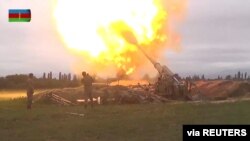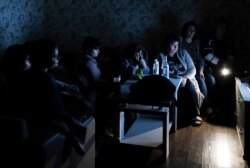Forces of Armenia and Azerbaijan continued fighting around the Nagorno-Karabakh enclave for a second day on Monday, despite calls from the international community for the hostilities to end.
Both sides exchanged accusations of using heavy artillery. The Azeri defense ministry said Armenian forces were shelling the town of Terter.
The breakaway region reported that at least 27 more soldiers were killed Monday, bringing to 58 the number of its soldiers killed since Sunday when it says Azerbaijan launched an air and artillery attack.
The region also reported two civilian deaths. There was no official information about any Azeri military casualties.
United Nations Secretary-General António Guterres condemned the heavy fighting and expressed regrets for “the loss of life and the toll on the civilian population,” his spokeswoman said in a statement.
The secretary called on all sides in the conflict “to immediately stop fighting, de-escalate tensions and return to meaningful negotiations without delay,” the statement said, adding that Guterres will speak to the President of Azerbaijan and the Prime Minister of Armenia.
U.N. spokesman Stephane Dujarric said Monday that Guterres is urging both leaders for the “resumption without precondition of meaningful negotiations without delay.”
The fighting has prompted fears that regional powers Russia and Turkey could be drawn into the violence. Moscow has a defense alliance with Armenia, while Ankara backs Azerbaijan.
Kremlin spokesman Dmitry Peskov called Monday for hostilities to immediately end and said the situation “is a cause for concern for Moscow and other countries.”
Turkish President Recep Tayyip Erdogan said Armenia’s immediate withdrawal from the region was the only way to ensure peace.
The United States called Sunday for the hostilities to end. State Department spokeswoman Morgan Ortagus issued a statement saying the U.S. “condemns in the strongest terms this escalation of violence.” The statement urged both sides to work with the OSCE Minsk Group co-chairs “to return to substantive negotiations as soon as possible.”
The OSCE Minsk Group is tasked with finding a peaceful solution to the conflict. The OSCE is the Organization for Security and Cooperation in Europe.
The U.S., along with France and Russia, co-chair the OSCE Minsk Group, which issued a joint statement Sunday concerning the “large scale military actions along the Line of Contact in the Nagorno-Karabakh conflict zone.”
“We strongly condemn the use of force and regret the senseless loss of life, including civilians,” the co-chairs said. They appealed “to the sides to cease hostilities immediately and to resume negotiations to find a sustainable resolution of the conflict.”
They called on the parties in conflict to take “necessary measures to stabilize the situation on the ground,” adding that there is no alternative to a peaceful negotiated solution of the conflict.”
Armenia and Azerbaijan declared martial law and troop mobilizations on Sunday amid fighting over Nagorno-Karabakh, a disputed, primarily ethnic Armenian enclave in Azerbaijan.
"Get ready to defend our sacred homeland," Armenian Prime Minister Nikol Pashinyan said on Facebook as the clashes erupted.
About two dozen people, including civilians, were reported killed and over 100 wounded.
Armenia accused Azerbaijan of attacks on civilian settlements in the disputed region.
"Our response will be proportionate, and the military-political leadership of Azerbaijan bears full responsibility for the situation," the Armenian Defense Ministry said in a statement.
The ministry also said its troops shot down two Azerbaijani military helicopters and three drones after Baku’s forces began bombing the breakaway enclave, including its capital, Stepanakert.
Azerbaijan's Defense Ministry said it had launched a military operation along the "Line of Contact" between the two countries, “to suppress Armenia's combat activity and ensure the safety of the population."
The ministry confirmed the downing of only one Azerbaijani helicopter and said its crew had survived.
Armenian separatists seized Nagorno-Karabakh from Azerbaijan in a bloody war in the 1990s that killed an estimated 30,000 people.
Talks to resolve the conflict have been halted since a 1994 cease-fire agreement among Armenia, Azerbaijan, and Nagorno-Karabakh.
Peace efforts in the Nagorno-Karabakh conflict, mediated by the Minsk Group, collapsed in 2010.
Margaret Besheer contributed to this report.






